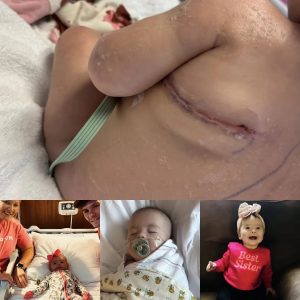Emma Harris, thirty-eight weeks pregnant and preparing for the arrival of her daughter, expected nothing more than a routine checkup when she arrived at her obstetric appointment. Throughout her pregnancy, Dr. Alan Cooper had been steady, reassuring, and calm—but during this final ultrasound, she sensed something was wrong. His trembling hand and hesitant expression only confirmed her fear. When she asked what was happening, he responded with a warning that would upend her life: she needed to leave the clinic and avoid her husband, Michael. He handed her a note urging her to trust her instincts. Shocked and terrified, Emma fled to her sister Claire’s home, trying to understand what danger her doctor saw that she herself had overlooked. As she replayed the appointment in her mind, a disturbing realization grew: the doctor’s fear was genuine, and it wasn’t about the baby’s health—it was about Emma’s safety.
At Claire’s house, Emma spent two days trembling between confusion and dread while ignoring Michael’s increasingly frantic calls. His messages shifted from concern to irritation and finally to possessive anger, reinforcing her sense that something was deeply wrong. Claire began investigating through her hospital contacts, uncovering that Dr. Cooper had previously intervened in cases where he suspected the mother was unsafe—a pattern that made his warning even more alarming. Reflecting on the months prior, Emma remembered moments she had dismissed: odd bruises she attributed to clumsiness, Michael gripping her stomach too firmly, the way he talked about wanting the baby close in a way that now felt disturbing. When Emma met with a hospital social worker, she learned that professionals can sometimes detect signs of external pressure on a fetus—stress not caused naturally. Suddenly, all the unease Emma had pushed aside gained clarity. When she finally spoke to Michael, his voice erupted with hostility, confirming her worst fears. It was no longer a question of misunderstanding—his tone of ownership revealed the truth she had ignored.
With Claire’s help, Emma sought legal protection and arranged to return home with police supervision to collect her belongings. The visit shattered any remaining denial. In the nursery, she discovered a lock installed on the outside of the door—something that could trap a child inside. The sight made her knees buckle; it was clear Michael’s intentions were rooted not in love but in control. The lock represented the physical manifestation of a growing pattern she had tried to rationalize. This discovery, paired with her doctor’s warning and Michael’s escalating behavior, strengthened her resolve to protect herself and her unborn daughter. Over the next weeks, legal hearings unfolded. Michael denied everything, but the evidence of control—along with testimony from Emma, Claire, and the medical professionals—created a compelling case. The judge granted Emma a permanent protective order, formally safeguarding her from a man who no longer saw her or their child as partners in a family, but as possessions.
In early October, free from Michael’s influence, Emma gave birth to her daughter, Sophia Grace. The labor was long, but the moment Emma heard Sophia’s first cry, she felt a profound shift. The oppressive fear she had carried for months loosened, replaced by fierce protectiveness and relief. Dr. Cooper visited afterward, reassuring her that she made the right choice in leaving. Emma, overwhelmed with gratitude, thanked him for noticing what she couldn’t bring herself to see. Yet the transition into motherhood after trauma was not simple. Exhaustion and intrusive memories followed her, but so did support: Claire’s unwavering presence, therapy sessions, and the grounding comfort of holding Sophia close. As she slowly built a new rhythm, a letter arrived from Dr. Cooper praising her bravery and reminding her that trusting her feelings had saved both her life and her baby’s.
By spring, Emma had settled into a new apartment full of sunlight and peace—an environment where she and Sophia could finally breathe. No locks on doors, no tension in the walls, no lingering shadows of control. Each night, she sat by her daughter’s crib, listening to Sophia’s steady breaths, grateful that their lives were no longer shaped by fear. Emma’s journey became a testament to intuition, resilience, and the courage required to walk away from danger, especially when it hides behind the face of someone once loved. Her story serves as a reminder that instincts often speak before the mind catches up, and that listening to those whispers can mean the difference between remaining trapped and forging a new beginning. Emma didn’t just save her daughter—she reclaimed her own strength, rebuilt her life from the foundation up, and stepped into a future defined not by fear, but by freedom and hope.




